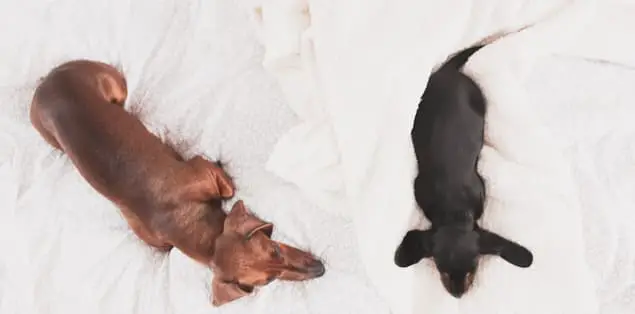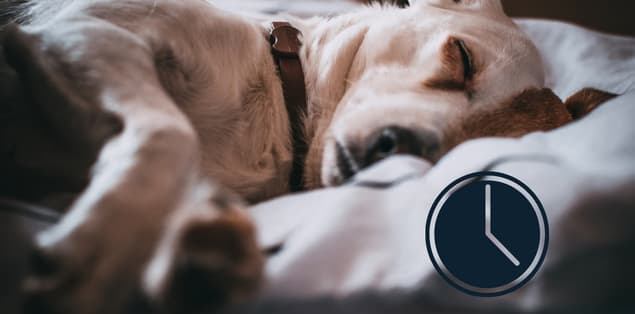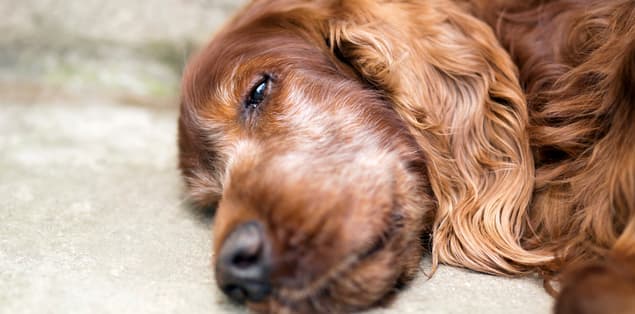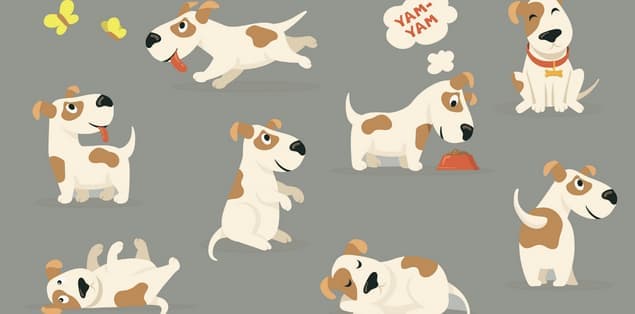There are a lot of first-time dog owners who are taken aback by how much their dogs sleep. Because of how often their dog sleeps, they start to worry that they are sick because of all of their naps.
How much rest should dogs get? You may relax knowing that sleeping 12–14 hours throughout 24 hours is typical for an adult four-legger. So, if your dog sleeps all day, that is typical.
But if you are curious about how much sleep pups get, the answer is still longer. This increases significantly greater for pups at around 18 to 20 hours.
So without further ado, let’s get into the article!
Why Do Dogs Sleep So Much?

Dogs seem to get far more rest than humans do. In contrast to others who have hectic schedules and don’t always pay attention to the cues their bodies provide them, these folks only go to sleep when their bodies tell them they need to. Also, seeing a dog sleeping is very adorable.
Dogs need their rest to function correctly.
According to Dr. Nicholas Dodman, a professor emeritus at Tufts University, “electrical activity is taking place in our brain all day long, and random, disordered material is getting stored in numerous regions.” “When we sleep, we order things, and dogs do the same. It’s quite soothing, and if you don’t let dogs have it, they’ll go crazy.”
Dr. Joan C. Hendricks, VMD, Ph.D., Dip ACVIM, adds that sleep is beneficial to the growth of a dog’s brain, memory, and learning ability. In addition, it also strengthens their immune system. Finally, she argues that humans and animals that don’t get enough sleep are more likely to become sick.
Many professionals believe your dog’s poor disposition may also be attributable to a lack of sleep.
And it seems natural that large-breed dogs, pups, and older dogs require even more sleep. So it takes longer for larger dogs to recover from the effort they put into moving their bodies because they must work harder.
Young puppies have much energy to spend as they run about and investigate their environment. Then, once their bodies have fully recovered, they go to sleep for an extended period to prepare for another round of play.
For their bodies to recover from the wear and tear of everyday activity, senior dogs need more sleep.
How Many Hours a Day Does a Dog Sleep?

Most dogs will spend around half of each day sleeping or approximately 12 hours out of every 24 hours. Puppies, big breeds, and senior dogs are likely to sleep longer, while dogs of tiny breeds and those used for working may sleep less.
Dogs will spend an additional 30 percent of their waking hours doing what we call “loafing,” in addition to the 50 percent of the day they spend sleeping. But, as is the case with human beings, loafing refers to the state in which a dog is awake but not doing much of anything other than “hanging around.” In most cases, they spend their time loafing by laying down, watching other people go about their day, and generally delighting in the state of being lazy.
That amounts to an astounding eighty percent of the dog’s day is spent doing very little of anything at all.
It would seem that living the life of a dog is a relaxing experience. Get out of bed, use the restroom outdoors, come back in, have something to eat, and then go back to sleep. Again, get up, spend some more time outdoors, eat supper, and then go back to bed for another snooze.
It can seem like a substantial portion of time is being spent sleeping. However, this is a relatively standard amount of time spent.
Is It Normal for a Dog to Sleep 20 Hours a Day?
Several larger dog breeds, such as Newfoundlands, Saint Bernards, and Mastiffs, are known to sleep over 20 hours a day; thus, you need not be alarmed if your giant dog spends most of the day napping. This is perfectly typical behavior for huge dogs. Dogs and humans have radically different patterns of sleep and wakefulness.
Puppies have an even greater sleep need, generally snoozing for 18-20 hours a day until they are around 12 weeks old. Dogs will start to sleep longer as they approach their senior years because their bodies and brains get more exhausted quickly. It is quite normal for dogs to sleep 20 hours a day.
Why Do Old Dogs Sleep So Much?

As your adult dog reaches its senior years, its typical slumber patterns will shift. The physical changes they experience as they age will be similar to the shift in their sleep cycle from when they transitioned from being a puppy to adult dogs. Hence, causing the dog’s sleep patterns to alter.
Your dog may be sleeping much more than your dog’s normal sleep patterns. They may choose to sleep through your homecomings rather than rush to greet you with kisses. It’s also possible that they sleep for the better part of the day and wakes up to wander about the home in the middle of the night. A dog’s health is restored in this way.
Because of the natural slowing down, that comes with advancing age and, in certain cases, because of age-related health concerns, senior dogs need more sleep.
Why Do Small Dogs Sleep So Much?

There are various reasons why small dogs sleep so much :
Species of Dog
The size of a dog, the activities it enjoys, and even how rapidly it will age are all dependent on its breed. All of these different circumstances may influence the need for sleep in a dog. Generally, a smaller dog breed takes longer to attain old age and needs less sleep during that time.
Because of their propensity to sleep a lot, we often call many breeds of dogs “lazy dogs,” including Greyhounds, Bullmastiffs, Chows, Saint Bernards, Basset Hounds, and Newfoundlands. They may sleep for as much as 18 hours a day on average.
Anxiety, Stress, and a Lack of Activity
Anxiety, worry, and boredom may cause a dog to experience increased levels of sleepiness, which is why such a dog will sleep more than normal. So, for example, when your dog is under pressure or experiencing anxiety, you may notice that they become sluggish and nap more often than usual. It can excite and improve a dog’s mental and physical fitness by providing a schedule that includes activities. This will help the dog.
Activity level
Dogs who are occupied the most of the day with activities because they have jobs to do will have a higher activity level than dogs that do not have jobs to do. The amount of rest dogs need is also influenced by the tasks you bred them for.
Insufficiency in Thyroxine
Hypothyroidism is another name for this condition. As a result of the under-secretion of thyroxine, which generally slows down the chemical processes that take place inside the cells of the body, particularly those connected to the metabolism, the dog seems to be in poor condition. However, younger dogs are far less likely to be affected by hypothyroidism; the condition is nevertheless possible in rare cases.
Hypothyroidism is more prevalent in elderly dogs. Labradors, Great Danes, Dachshunds, and Doberman Pinschers, amongst other breeds, are among the most prone to acquiring this disease.
Diabetes
The increased likelihood of the dog developing hyperglycemia due to the body’s inability to manufacture insulin in the quantity required by the body might have a significant negative impact on the animal. For example, certain dog breeds are more likely to develop diabetes than others. These dog breeds include the likes of Dachshunds, Keeshonds, and Australian terriers, among others.
Infection Caused by Bacteria
Leptospirosis is an ailment caused by bacteria and is very infectious due to its spread. Canines are susceptible to contracting leptospirosis if they come into close contact with the urine of diseased humans or other dogs. Additionally, it may quickly spread via water, soil, and other mediums. The prevalence of it is greatest in warmer climates.
The Causes of Your Dog’s Insomnia?
There are several reasons why your dog could be experiencing insomnia:
Injury, Illness, Or Pain
Your dog’s inability to remain still and feel comfortable due to painful arthritis may cause sleeplessness. However, using prescribed painkillers or certain massage techniques may be helpful.
When their airways clog, dogs with sleep apnea, often observed in flat-faced dogs and fat canines may suddenly wake up. Multiple sleep disruptions may be annoying and make a dog feel exhausted.
Once a veterinarian has checked out any medical problems, the next step is to determine whether there are any other potential causes of your dog’s restlessness.
Inadequate exercise
Many behavioral problems stem from a lack of exercise. For example, your dog needs a way to release its energy. The amount of activity your dog needs might vary depending on their age and degree of energy. However, it’s essential to know what kind of dog you have and provide that necessary quantity of exercise.
Due to a lack of enrichment and physical activity, one may have an excess of energy and unhappiness. Dogs might be destructive or unmotivated, but they can also get stressed and worried, which can interfere with sleep. When you combine those emotions with not getting enough sleep, things may rapidly get out of hand. For example, a worn-out dog will naturally fall asleep.
Anxiety
Another significant contributor to sleep issues is anxiety. Dogs may experience anxiety for many different causes. The best method for establishing a regular sleep schedule for your dog is to address the root cause of the worry. The following are some typical reasons for canine anxiety:
- New environment
- Loss of companionship (s)
- New additions to the family or departures of persons or animals
- Neglect
- Fear
- Inadequate exercise
- Frightening noises, such as those from pyrotechnics, thunderstorms, or construction
- Compulsory socialization
- Former trauma
Speak to a competent behaviorist or trainer about the best ways to help your dog feel more at ease on their own if they are experiencing anxiety.
The bottom line: It’s a positive indication that your dog naps sometimes throughout the day and all night. It implies that kids are receiving lots of exercises, eating a good, balanced diet, and feeling secure in their surroundings.
Final Words
A dog sleeps for 12–14 hours throughout 24 hours. This increases significantly greater for pups at around 18 to 20 hours. Sleep is beneficial to the growth of a dog’s brain, memory, and learning ability and strengthens its immune system. Senior dogs need more sleep. Puppies, dogs of big breeds, and senior dogs are likely to sleep longer.
Dogs will spend an additional 30 percent of their waking hours doing “loafing” or awake but not doing much other than “hanging around.” It is quite normal for dogs to sleep 20 hours a day. In addition, senior dogs have a greater need for increased sleep due to slowing down and age-related health concerns.
Anxiety, worry, and boredom may cause a dog to experience increased levels of sleepiness. It can excite and improve a dog’s mental and physical fitness by providing a schedule that includes activities. A dog’s sleep is very deep.
This will help the dog sleep more comfortably. Dogs with sleep apnea may wake from a bad night’s sleep. Lack of exercise can cause dogs to become stressed and worried, which can interfere with sleep. The best way to address anxiety is to address the root cause of the worry.
